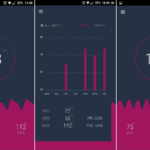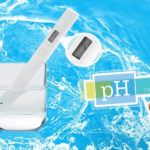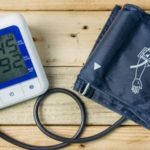Importance of Monitoring Blood Pressure Regularly
Blood pressure is defined as the pressure exerted by blood on the walls of the arteries. It plays a crucial role in delivering oxygen and nutrients to the body’s tissues. Blood pressure is determined by the strength of the heart’s contractions and the resistance encountered within the arterial system.
Without blood pressure, the human body is unable to circulate blood efficiently, leading to a lack of oxygen and essential nutrients reaching vital organs. As a result, normal bodily functions are compromised.
Regularly monitoring your blood pressure at home allows for accurate and consistent record keeping in a comfortable setting, leading to early detection of any potential health concerns. A simple routine of measuring your blood pressure for 10 minutes each day will offer the following advantages:
- Regular blood pressure monitoring is essential for early detection of abnormalities in the body, aiding in the timely diagnosis of diseases.
- Maintain good health by regularly monitoring and improving blood pressure levels.
- Performing blood pressure measurements at home offers a number of benefits, including saving on travel expenses, reducing medical expenses in clinics and hospitals.
- Differences in Home and Clinic Blood Pressure Measurements
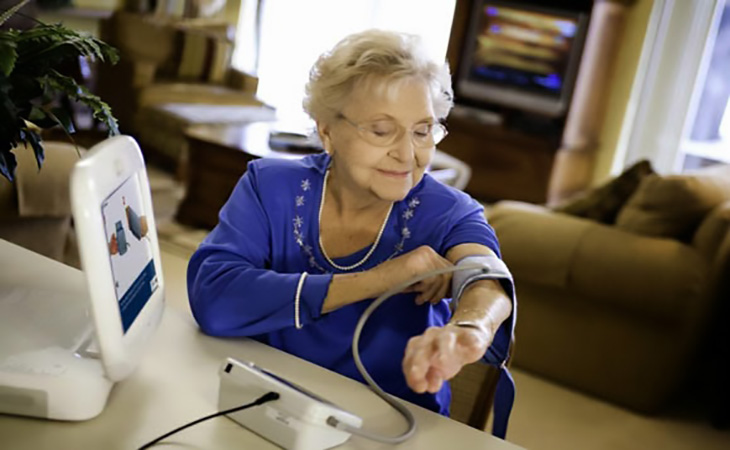
Measuring Blood Pressure Accurately: Understanding Its Importance
Accurate results are paramount in any health check activity, particularly in measuring blood pressure. Such accuracy is vital in diagnosing the risk of cardiovascular diseases or stroke.
Incorrect blood pressure measurements can significantly impact the accuracy of the results, preventing an accurate assessment of your current health status.
-
If the blood pressure reading is lower than the actual value: It may be due to an incorrect sitting posture, leading to an inaccurate measurement of blood pressure.
-
If the blood pressure reading is higher than the actual value, it may be attributed to improper cuff wrapping.
It is important to note that inaccurately low blood pressure readings may give a misleading perception of good health, potentially leading to delayed or inadequate treatment. Conversely, readings that are higher than the actual blood pressure can result in misunderstandings or premature medication use.
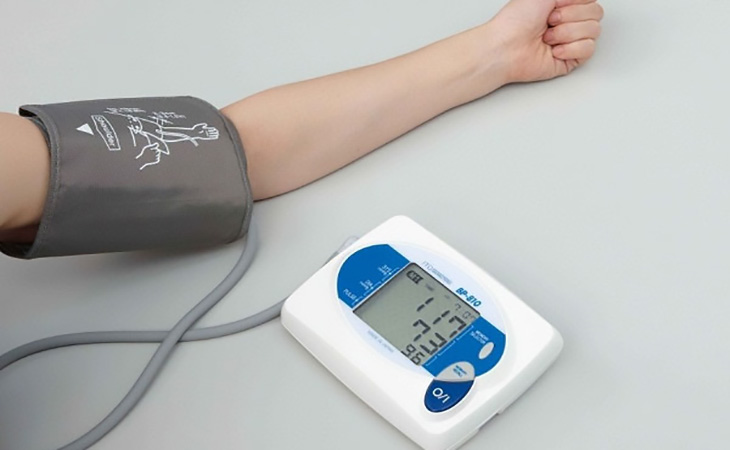
Study Reveals Most Accurate Time to Measure Blood Pressure
To obtain the most accurate blood pressure measurement, it is important to measure at the same time each day. This timing may vary for each individual. Generally, blood pressure tends to be lower in the morning upon waking up and higher during daily physical activities.
For accurate blood pressure measurements, it is important to consider the following requirements for the time at which the measurements are taken:
Business Conference Schedule
Business Conference Schedule
Day 1
Morning Session
- 9:00 AM – Welcome and Introduction
- 9:30 AM – Keynote Speaker: John Smith on “Leading with Vision”
- 10:30 AM – Break
- 11:00 AM – Panel Discussion: “Innovations in Business Strategy”
Afternoon Session
- 1:00 PM – Workshop: “Building Effective Teams”
- 2:30 PM – Break
- 3:00 PM – Seminar: “Negotiation Techniques”
- 4:30 PM – Closing Remarks
Day 2
Morning Session
- 9:00 AM – Recap and Day 1 Review
- 9:30 AM – Keynote Speaker: Jane Doe on “The Future of Business”
- 10:30 AM – Break
- 11:00 AM – Panel Discussion: “Business Ethics in the Digital Age”
Afternoon Session
- 1:00 PM – Workshop: “Effective Communication in the Workplace”
- 2:30 PM – Break
- 3:00 PM – Seminar: “Strategies for Business Growth”
- 4:30 PM – Closing Remarks and Conference Wrap-Up
-
The measurement of weight should not be done immediately upon waking up or right after eating breakfast.
-
In order to accurately track your progress, it is important to measure yourself at the same time each day.
It is recommended to measure blood pressure approximately 30 minutes after waking up, after using the restroom, and prior to having breakfast.
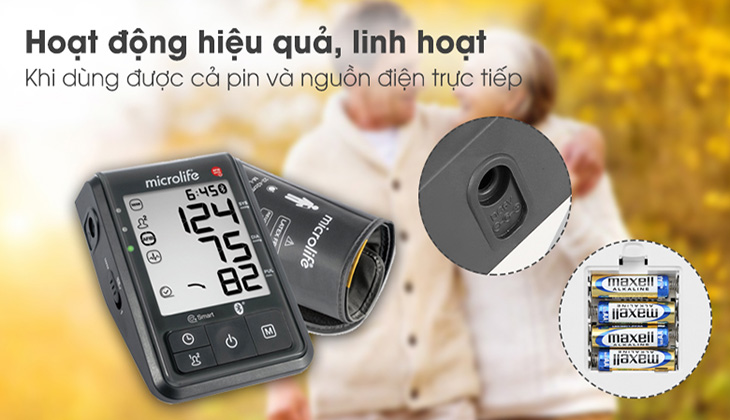
“How to Achieve the Most Accurate Readings with an Electronic Blood Pressure Monitor”
To ensure accurate readings, it is crucial to use electronic blood pressure monitors correctly. The following guide outlines the proper usage of these devices for optimal results.
Learning How to Operate a Device
The electronic monitor functions on a straightforward principle. It indirectly gauges blood pressure oscillation and records the measurements in mmHg. Subsequently, the monitor presents 3 essential parameters, comprising of systolic blood pressure, diastolic blood pressure, and heart rate.
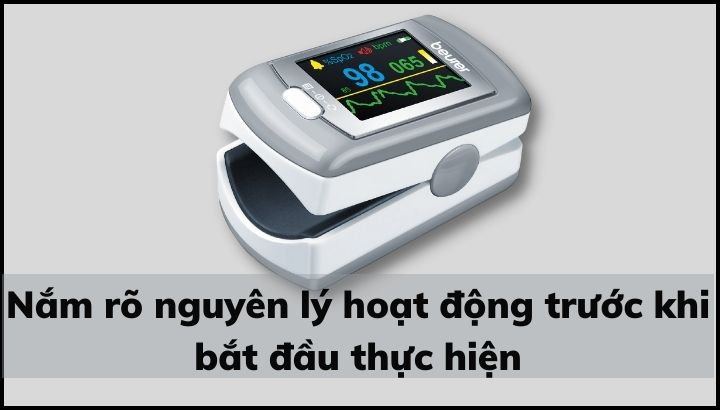
Preparing before Measuring: Step 2
For precise blood pressure readings, it is important to observe the following guidelines before measuring:
- Please refrain from consuming alcohol, tobacco, and any food or beverages containing caffeine for at least 30 minutes prior to taking your blood pressure.
- It is advisable to refrain from engaging in physical exercise for a duration of at least thirty minutes prior to measuring blood pressure. Additionally, it is recommended to limit blood pressure measurements during periods of stress.
- To ensure an accurate reading, it is recommended to find a calm and cozy environment. Take a few deep breaths and position the cuff at the heart level, as instructed. Prior to measuring, take a moment to relax for a duration of 5 minutes.
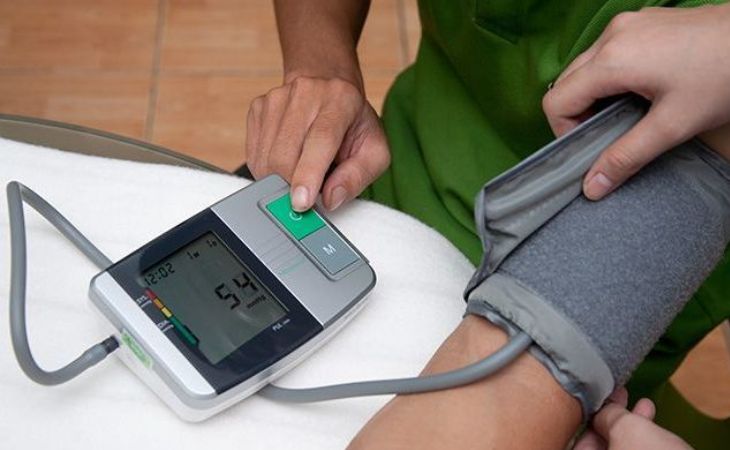
- Please ensure the accuracy of the device before performing measurements. It is recommended to take blood pressure readings at least twice, with each measurement spaced at least 5 minutes apart. In the event that the values between the two measurements differ by more than 10mmHg, it is advised to re-measure multiple times, allowing for a longer rest period in between. The average of the last two measurements should be considered as the final result.
- It is advisable to consistently track blood pressure levels at a specific time each day and maintain a record of these measurements. This practice aids in monitoring any potential abnormalities and enables informed discussions with healthcare professionals when necessary.
Maintaining Social Distancing While Taking Measurements
To ensure the optimal functioning of the blood pressure monitor, it is essential to position it at heart level. It is important to avoid placing the device either too high or too low in relation to the heart. The left arm is the recommended position for accurate measurements, as it is closer to the heart compared to the right arm.
Please assume a seated position with your feet parallel to the floor and maintain stillness and silence during the measurement to ensure accurate results.
Discover our selection of wrist blood pressure monitors
To ensure accurate measurement results, please follow these guidelines when using the blood pressure monitor:
1. Roll up or wear short sleeves before wrapping the cuff.
2. Do not wrap the cuff over the sleeve.
3. Position your thumb parallel to the display of the blood pressure monitor.
4. Maintain a wrist position approximately 1-2 cm above the cuff location.
Before using the device, please make sure it is properly prepared.
To start using the device, press the ON/OFF button. This will initiate the automatic inflation of the cuff. If the pressure in the cuff is insufficient, the device will automatically increase the inflation to achieve the required measurement pressure.
When the cuff reaches the required level, it will automatically reduce the pressure. The blood pressure and heart rate readings will be shown on the LCD screen.
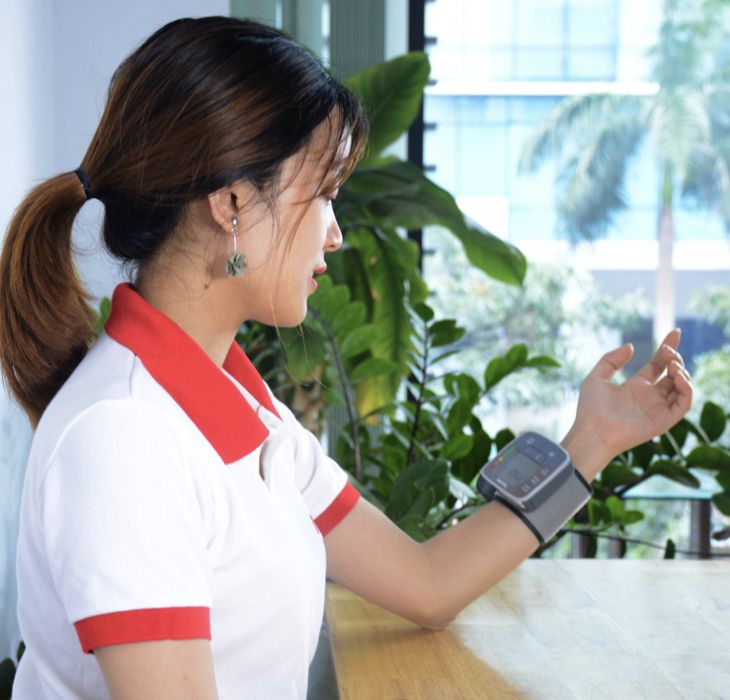
Arm Blood Pressure Monitors
Our arm blood pressure monitors are a reliable and convenient way to monitor your blood pressure at home. Designed with accuracy and ease of use in mind, these monitors provide accurate readings to help you stay on top of your health. Whether you have high blood pressure or just want to keep track of your readings, our arm blood pressure monitors are a must-have for your home healthcare arsenal. With advanced features and a user-friendly interface, you can trust our arm blood pressure monitors to help you take control of your health. Shop now and start monitoring your blood pressure with confidence.
To ensure accurate blood pressure measurements, it is recommended that you wear short sleeves or roll up your sleeves to expose the upper arm. Alternatively, you can lift the entire sleeve to the measuring position. Whether you choose to measure your blood pressure while lying down or sitting, it is important to always place the cuff at the level of your heart.
To accurately measure blood pressure, follow these steps:
1. Place the cuff around the upper arm, positioning it approximately 2-3 cm above the elbow and above the brachial artery.
2. Ensure that the arm circumference falls within the suitable range of 22-35 cm for the cuff.
3. Proceed with the blood pressure measurement.
Please press the ON/OFF button to activate the device. The cuff will then be inflated automatically. In the event that the cuff pressure is insufficient, the device will adjust and increase the pressure to achieve the required measurement pressure. Once the necessary pressure is achieved, the device will gradually decrease the pressure.
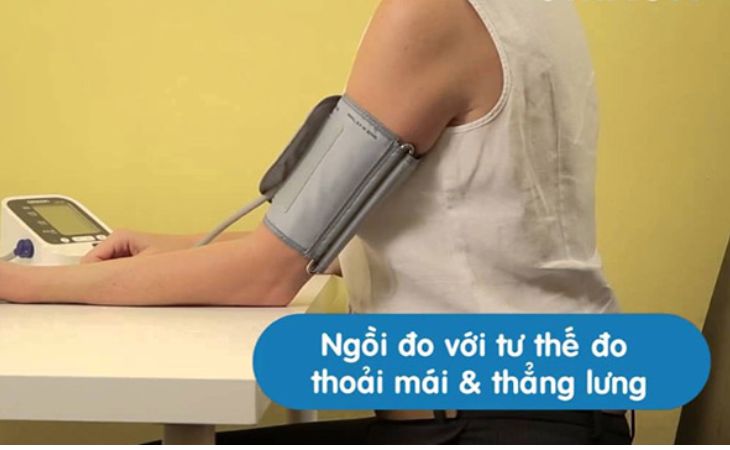
Reading Result Parameters and Criteria in Step 4
After obtaining a blood pressure measurement, the display will show three key parameters. The systolic blood pressure reading, identified as SYS, will be presented at the top. Directly below, the diastolic blood pressure reading, denoted as DIA, will be shown. Lastly, the heart rate reading, referred to as PULSE, will be displayed. The recorded blood pressure result is 118/78.
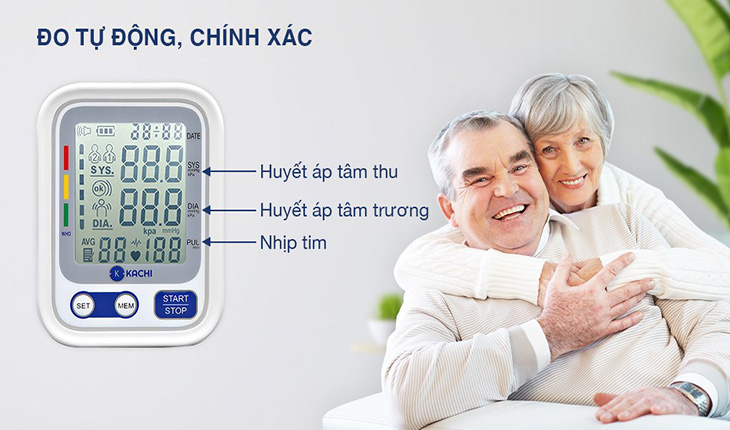
Tips for Operating an Electronic Blood Pressure Monitor at Home
- Please remember to measure your blood pressure twice a day, once in the morning and once in the evening. It is important to keep a record of all your measurements, including the date and time, in a logbook. This will help your healthcare provider evaluate your progress during follow-up visits.
- Please refrain from conducting consecutive blood pressure measurements in a short timeframe. It is highly recommended to allow for a 15-minute interval before proceeding with subsequent measurements.
- To accurately assess your blood pressure levels, it is essential to measure them consistently at the same time each day using a reliable monitor. It is recommended to record your measured results over time, as a single measurement may not fully reflect your true blood pressure status.
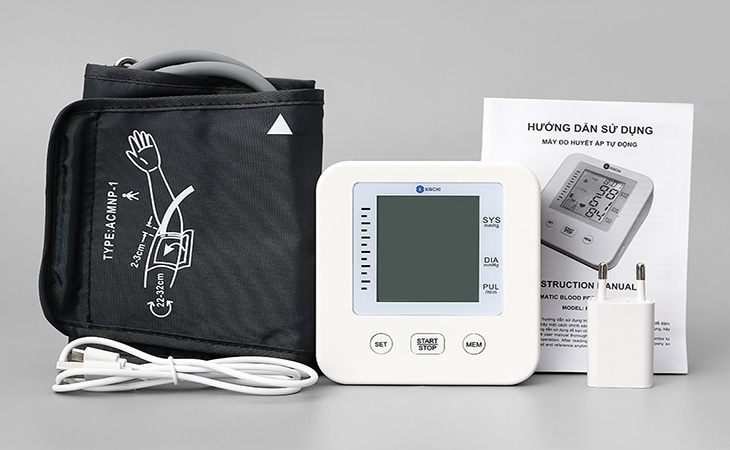
Troubleshooting Electronic Blood Pressure Monitors: 6 Mistakes and Their Fixes
| Error | Cause | Solution |
| Display shows very low or no reading | Cuff is not wrapped correctly | Roll up the cuff and tubing, without folds. |
| Moving or talking during measurement | ||
| Sleeve affecting the cuff | ||
| Cuff pressure does not increase | Tubing is not inserted tightly into the device | Slightly fold the tubing inward towards the cuff. |
| Air leakage in the cuff | ||
| Cuff deflates too quickly | Loose cuff | Apply adhesive to secure the cuff. |
| Unable to measure, readings too high or too low | Cuff is not properly inflated | Maintain the same position throughout the measurement process, without moving or talking. |
| The screen does not display when pressing a button | Low battery | Insert the battery into the battery compartment and close the battery cover. |
| Incorrect battery polarity | ||
| Other errors | Other causes | Press the START / STOP button to stop or cancel the measurement process, turn off the device, and release the air in the cuff. |
| If the problem persists, replace with a new battery | ||
| If the device still cannot be resolved, contact the dealer or distributor | ||
Tips for Maximizing Lifespan and Storage of the Device
- Please ensure that the device is stored in a well-ventilated area, away from direct sunlight, as this will help preserve its functionality and extend its lifespan.
- Properly roll the cuff and tubing together, ensuring that they are not folded.
- To connect the tubing, carefully insert it into the cuff.
- Please refrain from attempting any repairs on the device yourself. It is advised to avoid disassembling the device without proper expertise. In the event of any faults or malfunctions, kindly bring it to the designated warranty center for assistance.
- To clean the cuff, please follow these steps using the appropriate method:
1. Obtain a soft cloth and mild soap.
2. Gently rub the cuff with the cloth and soap.
3. Rinse the cuff thoroughly with water.
4. Allow the cuff to dry completely before using it again. - Please handle the device with care and refrain from dropping it or causing any impacts or vibrations.
- Please disconnect the tubing from the socket when it is not in use.
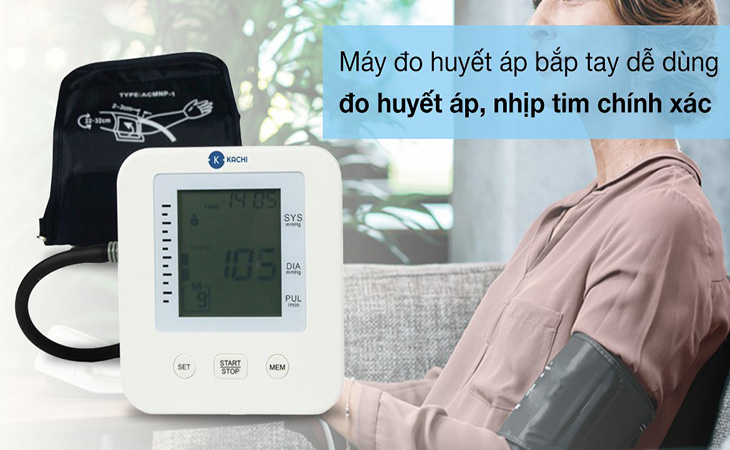
Thank you for reading! We hope this article has provided you with valuable insights on effectively using an electronic blood pressure monitor to obtain accurate results. Should you have any further inquiries, kindly leave a comment below, and our team will be more than happy to assist you.
Unlock 8 Benefits with a Daily 5-Minute Jog
Living a hectic lifestyle can make fitting in time to exercise difficult. However, studies have revealed that even just 5 minutes of jogging a day can lead to positive outcomes for your health, including a decrease in the risk of developing cardiovascular disease, extending your life span by up to 3 years, or even reducing the susceptibility to heart disease.

























